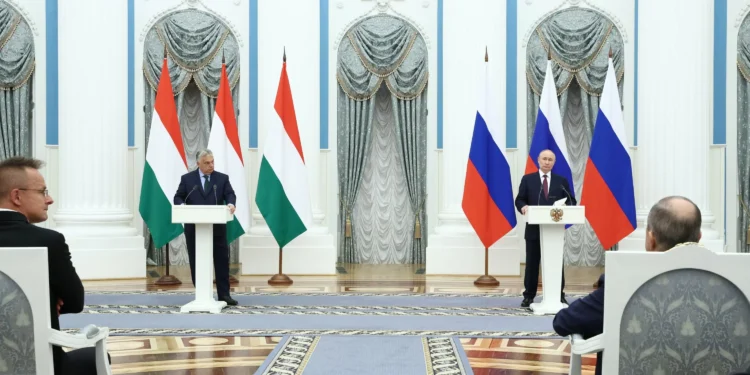Top EU Officials to Boycott Informal Meetings Hosted by Viktor Orban
In a bold move, top officials from the European Union have announced their decision to boycott informal meetings hosted by term president Viktor Orban. This decision comes after Orban held a series of meetings with Russian and Chinese leaders, raising concerns about his commitment to the EU and its values.
The European Union has always been a strong advocate for democracy, human rights, and the rule of law. These values are the foundation of the EU and have been the driving force behind its success. However, recent actions by Viktor Orban have raised doubts about his dedication to these principles.
Orban’s meetings with Russian President Vladimir Putin and Chinese President Xi Jinping have sparked concerns among EU officials. These meetings have been seen as a move towards closer ties with these countries, which have a history of human rights violations and disregard for democratic values.
The EU officials have made it clear that they will not participate in any informal meetings hosted by Orban until he reaffirms his commitment to the EU’s values. This decision has been met with widespread support from other EU member states, who see it as a necessary step to uphold the integrity of the EU.
The boycott of informal meetings is not just a symbolic gesture. These meetings are an important platform for EU leaders to discuss and address key issues facing the union. By not attending these meetings, the EU officials are sending a strong message to Orban that his actions will not be tolerated.
This move by the EU officials is a clear demonstration of their determination to uphold the values and principles of the European Union. It shows that the EU is not just a political and economic union, but also a union of shared values and beliefs.
The decision to boycott informal meetings is not a knee-jerk reaction. It is a result of growing concerns about Orban’s actions and their potential impact on the EU. Orban’s government has been accused of undermining the independence of the judiciary, restricting media freedom, and targeting NGOs and civil society organizations. These actions go against the core values of the EU and threaten the democratic fabric of the union.
The EU officials have also expressed their disappointment with Orban’s recent comments, where he praised China’s authoritarian model of governance. This is a clear departure from the EU’s stance on human rights and democracy, and it has raised serious concerns about Orban’s intentions.
The boycott of informal meetings is not meant to isolate Orban or Hungary. On the contrary, it is a call for Orban to reaffirm his commitment to the EU and its values. The EU officials have made it clear that they are open to dialogue and are willing to work with Orban, but only if he respects the principles of the EU.
The EU has always been a champion of democracy and human rights, and it will not compromise on these values. The boycott of informal meetings is a reminder to all member states that the EU is a union of shared values, and these values must be upheld by all.
The decision to boycott informal meetings is a strong statement from the EU officials, and it is a testament to their unwavering commitment to the EU and its values. It also sends a message to the rest of the world that the EU will not tolerate any actions that go against its principles.
In conclusion, the boycott of informal meetings hosted by Viktor Orban is a necessary step to uphold the integrity of the EU and its values. It is a clear message to Orban that his actions will not be tolerated, and it is a reminder to all member states that the EU is a union of shared values. The EU officials have shown great courage and determination in taking this decision, and it is a testament to their commitment to the EU and its future.



